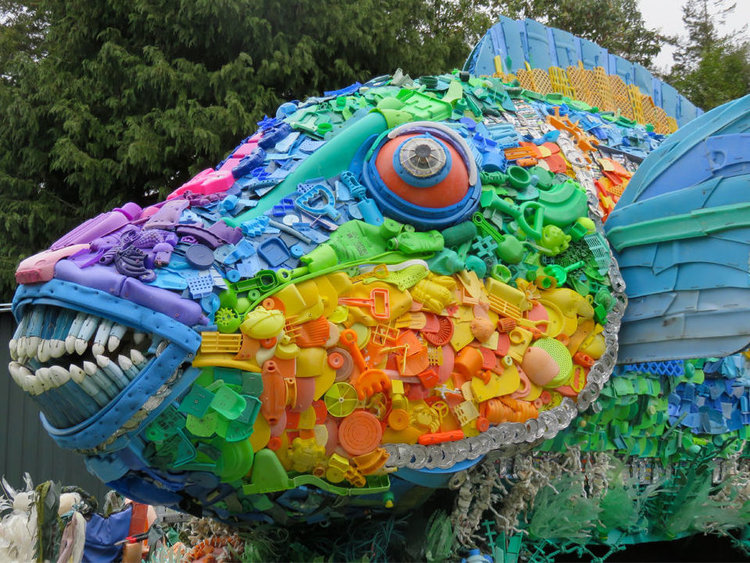
We've spent three weeks examining some of the issues glaciers and now rivers. This is a long enough time to get a basic overview of the issues, but not nearly enough time to become an expert. Hopefully though, this unit has piqued your interest, and this might be something that you investigate further in the coming months.
Why Aren't These Problems about Plastic Waste and Pollution Being Solved?
Great question.
- Why should we be the first to do something? We'll wait until someone else (normally USA or China) does something first.
- If we take a stand and don't overfish, then other people will take the fish that we were going to catch and we'll lose out. Classic Tragedy of the Commons mind-set.
- The world is going to s**t anyways, so let's just make money while we can
- These problems are too big for us to solve, so we just won't do anything
What's the Key to Successful Solutions?
In order for us to help conserve our oceans, we need to think about solutions on three levels:
CORPORATIONS GOVERNMENTS AND COMMUNITIES. INDIVIDUALS
This is our focus for Week 4. We can't save the oceans on our own, nor can we wait for big corporations to do all of the heavy lifting. Change will not happen in a capitalist society unless consumers and citizens demand it.
Let's remind ourselves of some of the key principles of sustainable solutions - 'REAL G' SOLUTION
R ealistic & culturally appropriate solutions
E ducation is the key, and should be tailored to specific communities, languages and cultures
A lternatives - think outside the box, research and development is key!
L egislation and regulations - we need laws, treaties, and protected marine areas (like national parks) and then we need those laws to be enforced with fines and penalties
G - Grassroots solutions will be effective. The small acts that individual citizens and communities commit to do, actually matter.
The other things that we need to remind ourselves is that these problems are incredibly complex. For example, the past three weeks we have discovered that:
- If you litter on the street, precipitation will carry that waste as surface runoff and it will end up in streams, and then carried into rivers, and then make its way into the ocean. The ocean is base level - all things end up there eventually.
- 8 of the 10 most heavily polluted rivers carry the majority of the plastic waste into the ocean, and so clean up plans for plastic waste needs to happen upstream, and not just along coastlines and in the ocean
- 8 of the 10 most polluted rivers are in Asia, but many of those countries have been accepting plastic "recycling" from North America and Western Europe, and its not entirely their waste
- Citizens that live in Canada have open channels to their governments, and also many corporations - your voices matter in the day and age of social media and communications.

Your task is to investigate solutions facing our oceans. As you do your research, you will investigate a corporate/large scale solution, a solution that you can do personally, as well as a new 'invention' or technology that is currently being tested.
You will describe the solution, and give a bit of a critique. There are no perfect solutions, so it's important to analyse the positives and negatives and to determine whether or not the actions are effective. I understand that you aren't an expert, but this is a good starting point to at least understand some of the possibilities.
HELPFUL LINKS FOR YOUR RESEARCH:
3. Reducing the plastic in your life - daily alternatives
https://www.eartheclipse.com/pollution/solutions-plastic-pollution.html
https://www.weforum.org/agenda/2020/03/plastic-waste-caterpillar-moth-larvae-biodegrade/
4. Make your Cosmetics Safer - Beat the Microbead
5. Going Zero-Waste - is it realistic? What could I do?
https://www.goingzerowaste.com/top-10-to-get-started/
6. Zero-waste recipes to reduce processed foods in your life
https://zerowastechef.com/recipe-index/
7. Tips to finding single-use plastic alternatives in your daily lives
Ways to Reduce plastic in your life.
Easy Ways to Reduce plastic in your life
https://learn.eartheasy.com/guides/the-best-eco-friendly-alternatives-for-the-plastic-in-your-life/
8. Cutting down exposure to microplastics
https://www.washingtonpost.com/health/youre-literally-eating-microplastics-how-you-can-cut-down-exposure-to-them/2019/10/04/22ebdfb6-e17a-11e9-8dc8-498eabc129a0_story.html
COMMUNITY AND CORPORATE SOLUTIONS
1. The Great Ocean Cleanup - New Technology and Innovation
2. Plastic Bank - Dealing with Poverty & Cleaning up the ocean (Vancouver-based social enterprise)
4. Creation of protected areas and marine reserves
- https://www.boatinternational.com/luxury-yacht-life/marine-life/new-marine-reserves-around-the-world--31949
- Canada's creating more protected areas on coastlines against oil and gas exploration
5. Bans on single-use plastics - Governments % Corporations take action
- https://www.nationalgeographic.com/environment/2018/07/ocean-plastic-pollution-solutions/
- https://www.weforum.org/agenda/2019/09/we-created-an-initiative-to-fight-plastic-waste-here-are-3-takeaways-from-our-first-year/
RESEARCH AND DEVELOPMENT - THINKING OUTSIDE THE BOX
Genetic Manipulation
Michelin 3D printed tires
Advertising & Education - Social Media Campaigns
3D printing Coral Reefs
Plastic Alternatives that Work - Or Are Actually worse for the environment
Mushroom Packaging
Inspiring Art! Using art to raise awareness and educate about plastic waste
Comments
Post a Comment